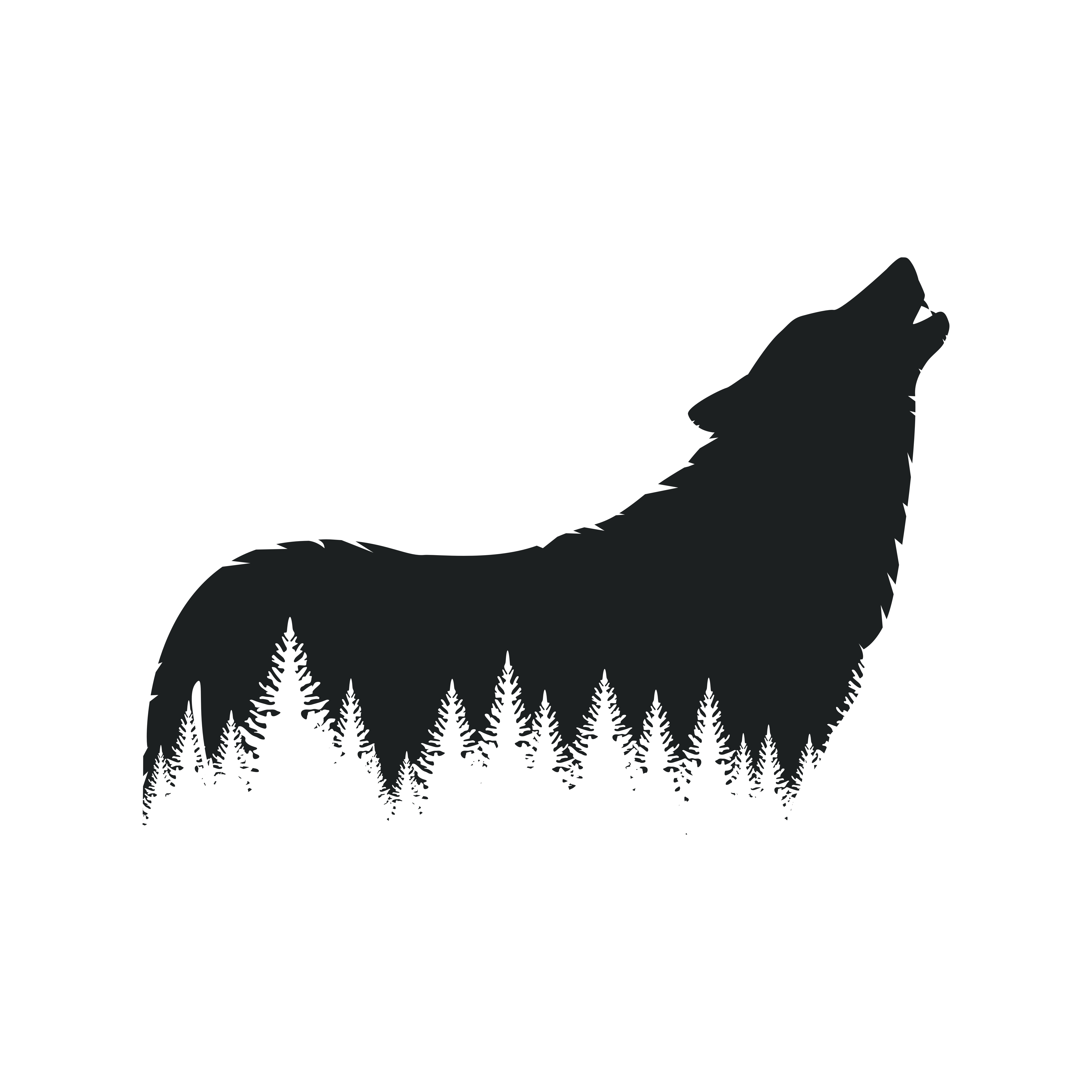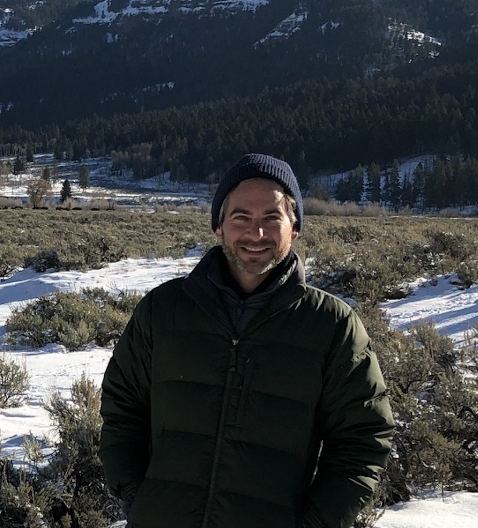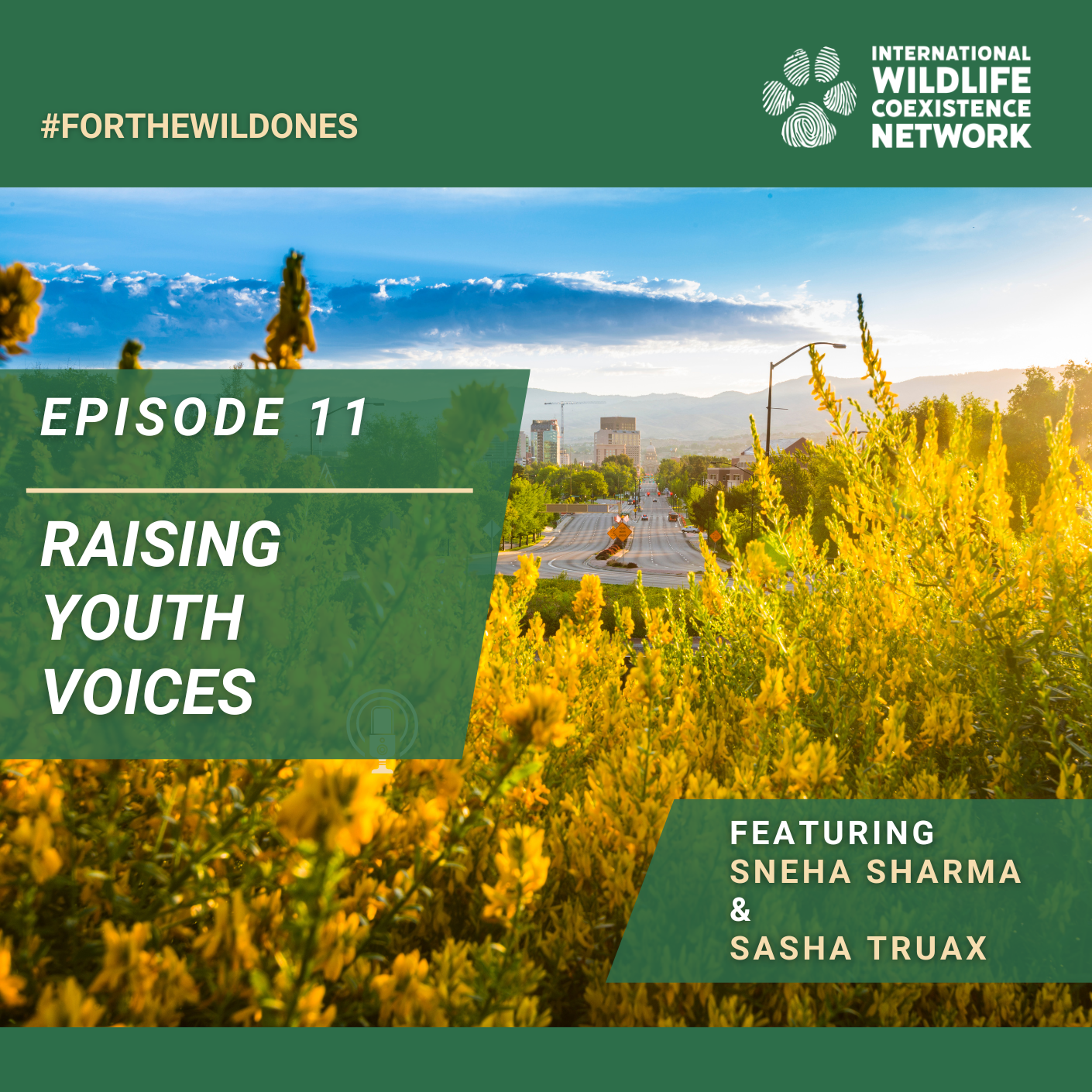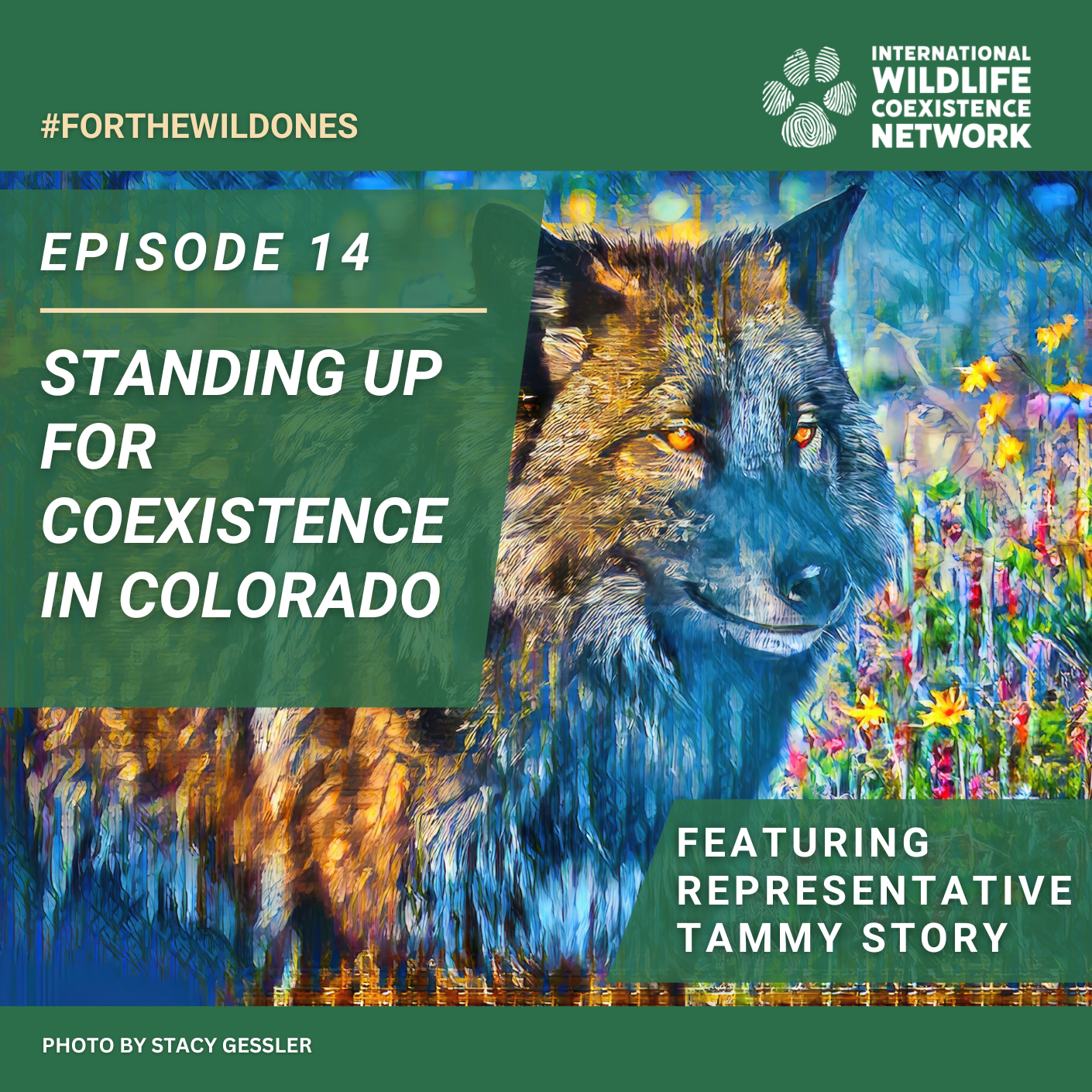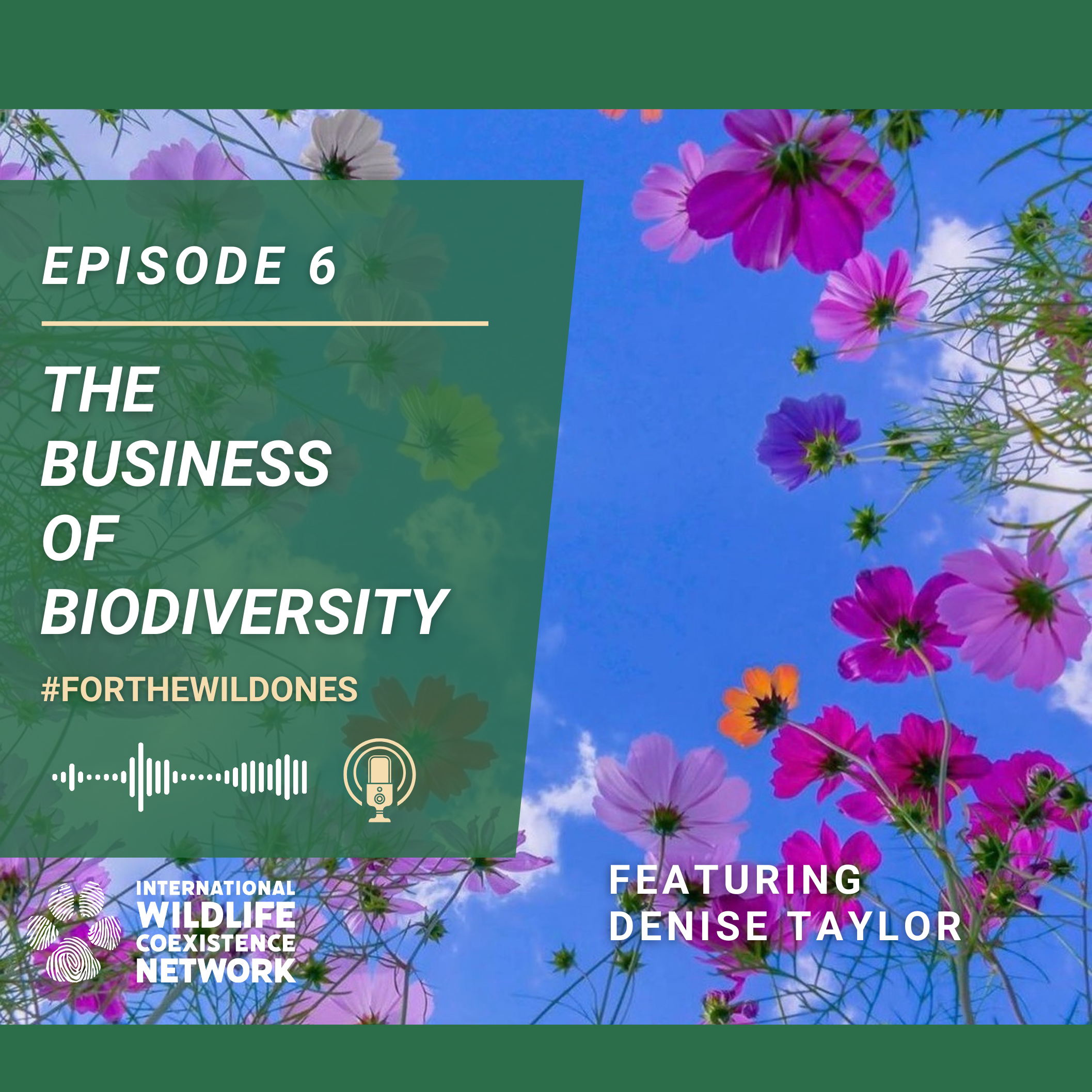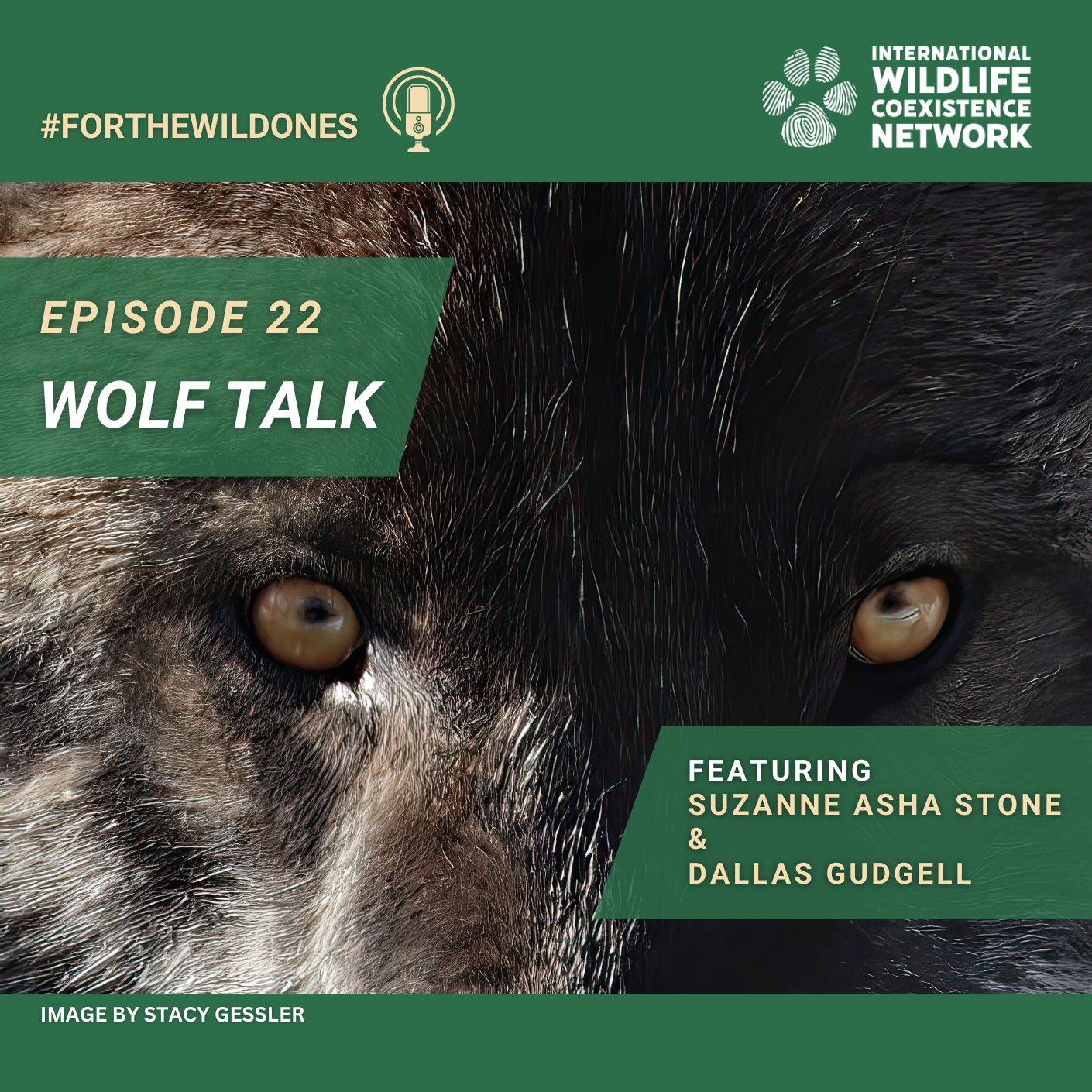Episode Transcript
[00:00:01] HOST: On this episode of for the Wild Ones, we're going to hear from two youth wildlife advocates who are challenging the status quo in their community.
Thanks for joining us. I'm your host, Josh Adler. This is another episode brought to you by the International Wildlife Coexistence Network. Every day we're helping people reshape, reconnect and recharge their relationship with nature. One of the best ways to do that is by raising up the voices of young people. But where do our guests, Sneha and Sasha from Boise, Idaho, draw their inspiration from?
Let's find out.
Do you two know each other?
[00:01:12] GUEST 1: Yeah, we were in tree club together.
[00:01:13] HOST: Aha, the famous tree club. So you had overlap at Timberline High School?
[00:01:20] GUEST 2: Yes, I was a senior when Sasha was a.
[00:01:26] HOST: Then just one year working together.
[00:01:28] GUEST 2: Yes.
[00:01:29] HOST: And, Sneha, you were president of tree Club then?
[00:01:33] GUEST 2: Yes, my senior year I was president.
[00:01:35] HOST: And, Sasha, are you president now?
[00:01:38] GUEST 2: Yeah.
[00:01:38] HOST: Nice. So we've got, we've got a lineage here. You're following in Sneha's footsteps. How does that feel?
[00:01:45] GUEST 1: They're big shoes.
[00:01:47] HOST: Why is that?
[00:01:49] GUEST 1: I mean, it was a great year.
Set a lot of precedents. Now, I don't know. Doing my best.
[00:01:58] GUEST 2: She's killing it.
[00:01:59] HOST: Yeah, from my understanding, you are killing it, as they say. Maybe you can go into a little bit more of what happened. Snail, when you were president?
[00:02:08] GUEST 2: 2021 to 2022 was when I was president. So that was the year one of our teachers, the tree club advisor, came back to in person school, as I did as well. So that was the year we were trying to get back into in person meetings and readjusting after how crazy Covid was. And so we just had a lot of different things thrown at us, more rallies to go to, just more trips we could go on together. So that was a big change. But I was not a part of tree club, actually my sophomore and junior years just because of COVID And so I did online school instead.
[00:02:42] HOST: So how did you get involved in tree club?
[00:02:45] GUEST 2: My junior year, I met Erin Stetsman, who is one of my favorite people on this planet. She was my teacher for AP bio online, and I got really close with her. Despite being in an online setting, we would have Google meets all the time and just got to know each other that way. We both went back to in person school in Timberline, and she told me about sustainability, environmentalism. And that's how I really got involved, was getting to know her and what she does. And she kind of put me on this path, and I'm so grateful I met her because it has changed my life, and I'm so glad I'm a part of the work that I do now.
[00:03:23] HOST: Sasha, I want to hear how you got involved in tree as well, but just really quick to follow up on this path that you're speaking about. What is that path that you're on now?
[00:03:32] GUEST 2: Yeah. This path is taking an active stance in my environment, doing my best to be involved with my community and doing what I can to protect the things that I love, which is the planet. I honestly don't know what the future is of this path. I just know that I want to continue on it. I want to keep doing my part as an engaged citizen.
[00:03:54] HOST: Well, for now, it's taking you to the University of Texas and a neuroscience major. Is that correct?
[00:04:00] GUEST 2: Yes. So I am a McDermott scholar at UT Dallas, and I am on the pre med track studying neuroscience, minoring in public health. I've always been interested in medicine. That's such a cliche answer for us pre med students to say. But in recent years, I've been looking at setting the intersection between medicine and environmentalism. I feel like a lot of the healthcare system today focuses on treating diseases, but not really focusing at the root cause of what are we dealing with. Why is this happening to us, whether that be lung problems due to polluted air and lack of clean water to people?
[00:04:40] HOST: You may be interested to hear that. I was just reading in the Wall Street Journal that cancer rates in young people are way, way up and medical researchers are looking for the cause. But a lot of people believe that it's pollutants, endocrine disruptors that are in our systems. We know that there are plastics in the clouds. We know there are plastics in the bellies of whales at the bottom of the ocean. So there's all these medical consequences to the degradation of our environment. We're starting to see those consequences play out in our lives. So, Sasha, I only know you through your recent testimony at the Idaho Wolf Depredation Control Board meeting, which was a triumphant meeting for those of us who were there to ask the board to rescind their contract that they had offered to an out of state aerial gunner to take out wolves in the Wood river wolf project zone. How did you feel about being a part of that meeting, and how did you feel about your role, your presentation at that meeting?
[00:05:44] GUEST 1: That meeting was definitely a new one for me because of the overwhelming support for wolves there. I think that's the most pro wolf meeting that I've ever been to. I'm used to being surrounded by a lot more viewpoints that differ from mine, but I felt there were other people at the meeting that were expressing similar opinions. So that was really cool that overwhelmingly people there were in favor of wolves. As far as my personal piece, I feel like I did get to say what I wanted to say, and I think it was hard. They're not going to create any direct action out of one instance, but I'm glad that I got to say what I did.
[00:06:25] HOST: I know that Suzanne and Dallas from Iwsen were really glad that you were there and that you did speak out. So let's back up now. How did you get involved in Tree, which is the Timberline High School research club on environmentalism? Is that correct? Is that a correct assessment?
[00:06:43] GUEST 1: Yeah. The acronym is teens restoring Earth's environment. So really, the Timberline high School environmental club, and we engage with the community a lot in that regard. I actually got involved in the same way as Neha through my teacher, Erin Sussman. She was my AP environmental science teacher through the class she pitched, hey, guys, guess what's happening with wolves? And I was immediately shocked. And she says, hey, yeah, if you're interested in this, you should check out our club. And as soon as I got there, I was surrounded by other people that cared a lot about the environment and instantly found myself in a very welcoming setting. And that was really cool. And I've been a part of tree club ever since.
[00:07:24] HOST: This brings up a couple of things for me. One, yay. Aaron Stutzman. Yay. Teachers who inspire their.
Did you. Did you know that you were interested in environmental advocacy? Did you know that that was something you wanted to be a part of before you heard about what was happening with wolves in Idaho?
[00:07:45] GUEST 1: I would say yes. It wasn't my first experience seeing that our environment is facing struggles. I'd been watching David Attenborough for a long time. I kind of introduced to some of these concepts, but definitely through wolves was the first time I had ever done anything personally to speak out against it and a chance to get involved and be a part of change, that was really impactful for me and a new direction where I actually felt like I was able to work toward these problems I was seeing.
[00:08:13] HOST: Why do you think it is you hadn't heard about the conflicts between Idaho state and wolves until your teacher brought it up?
[00:08:21] GUEST 1: Honestly, I think that's shocking, considering the fact that their reintroduction was such a big success in the state and the extent to which they're being persecuted without really limits in any regard? I'm not sure. And through follow up interviews with the community, we wanted to assess how much other people knew about the situation. And we were shocked to see that, really, no one did. Whenever we brought up the legislation, we really got back blank stares until we explained what was happening. And people were shocked by what was happening.
[00:08:53] HOST: Would one of you like to briefly overview or explain the legislation that is allowed for unlimited and unregulated takes of wolves in Idaho state? We're talking about resolution 1211.
[00:09:05] GUEST 2: I can explain a little bit, because it was enacted in my senior year, and then, Sasha, if you could fill in for me, if I'm missing anything. But senate Bill 1211 was passed in the, I believe, 2021 legislative session. And essentially, this bill said that 90% of Idaho's wolf population could be killed. And this was a big shock to us. We were like, who is regulating this 90%? First of all, how are we making sure that we're maintaining those levels? Second of all, why are wolves being targeted specifically? They are a keystone species in our ecosystem, and keystone species is basically an animal that a lot of other animals and species and plants depend on. And so seeing that 90% of them are able to be wiped out with no regulation was kind of shocking. And we had a personal story with timberline. We had an adopted wolf pack up in northern Idaho, and after this bill was passed, we didn't know the status of our pups for a while. And then we later found out that they were stomped on and mercilessly killed. And so we no longer have a timberline wolf pack.
[00:10:16] HOST: If you can just speak briefly to what it was like to experience that outcome emotionally, this wolf pack had been.
[00:10:23] GUEST 2: Adopted since before I was born. And although I never got to personally see these wolf pups, just having to imagine somebody filled with so much rage or having the urge to just stomp on these precious little pups that they just kind of went out, did what they felt like, just because they may have had some negative stereotype of wolves in their head of these ravenous creatures, it was shocking that someone was going to go out of their way to do such an inhumane deed. And it kind of fired up all of us. Like, what are you doing with our wolf pack? What was the reason? And so I'll let Sasha kind of talk more about how she felt in that moment.
[00:11:00] GUEST 1: Yeah, I was really struck by just the mercilessness of that and the way I saw no purpose. It was a wolf pack that had no prior livestock conflicts in that area. So it was a very preemptive attack. And the biggest thing for me is that that happened to our pack, and we only know that through extensive research. So that's what's happening to wolf packs across the state. Our pack is not alone in facing that.
[00:11:28] HOST: How does it make you feel about the state knowing that the hunting of the timberline act was for economic gain? Because maybe the hunters are filled with certain kind of emotions against wolves, but primarily they're there to make money, right? They're there because they know that the state of Idaho is going to pay them $2,000 for each wolf that they kill.
[00:11:55] GUEST 1: I mean, I don't think that reflects well on the attitude of the state at all. The fact that we as a state reintroduced wolves to the ecosystem and they did restore benefits, and then we were willing to take them out. The creatures that we had reintroduced. It almost makes you feel responsible as the reintroducers, even though I was no part of that. The fact that we brought them back and we were willing to tear them apart.
[00:12:23] HOST: Neha, can you speak more to the sense of responsibility that Sasha's bringing up? How is it that we are responsible.
[00:12:30] GUEST 2: For know we cause a lot of problems as humans. And going back to that reintroduction of wolves, we had seen this cycle of what would happen if we were to exterminate all wolves in the ecosystem. We had seen this in YelLowstone. Overgrazing happened due to rising elk populations, and the natural landscape was not the same. And we had worked so hard to reintroduce wolves and finally are restoring our natural ecosystem. Seeing things flourish again, it's just heartbreaking to see people look past the history and ignore that, ignore the trouble that we went through trying to bring our home back to its natural beauty. And although Sasha and I weren't a part of the reintroduction, we know the science, we know the history, and we understand the importance of it. And that's why we feel this pressure as students studying environmental science to use our voice and do something about it and make it be known what has happened in the past and why we are fighting for wolves.
[00:13:35] HOST: I love this notion of restoring our home to its beauty. To me, it brings the idea of, Sasha, you've got all THese plants behind you that people won't see, but you've got all these beautiful plants. But anybody who has plants in their house, if they imagine somebody coming into their house and just destroying all their plants and then walking away, nobody would tolerate that. Nobody would condone that kind of behavior. And yet that's what you're suggesting, which I think is appropriate. Sneha, what was your response after the pack was hunted? It seems to me like you did have an opportunity to share your voice with a number of different policymakers and people involved.
[00:14:13] GUEST 2: We started looking into, why is this happening in the first place in Idaho? Why are we going after wolves? Turns out Idaho has a big ranching community. A lot of people value their cattle, their sheep, and their livestock. We looked more into that, and we had the opportunity, in 2021, I believe, to speak with the Idaho resources Ranchland Commission. I think I'm saying the acronym correctly, but they came in and we got to talk to them because they actually had been putting out a sminny video documentary series, putting a negative story behind wolves, talking about how they're these ruthless animals that go after kill our livestock. They're ruining the economy for ranchers, for farmers. They're devastating. And we kind of lured them into our classroom. We're like, we want to know more about what's going on. And then as the meeting progressed, we got to ask some hard hitting questions, like, do you have the facts behind what you are putting out? Kind of putting a little bit of pressure on them. That was one of the ways that we first got to really see the other side and try to figure out what they're doing, but also letting them know that, hey, this is not backed by science. And then also later in the year, we got to go up north Idaho to Lapway, which we got to meet with some indigenous people and learn more about the significance of wolves and the cultural history behind these animals and how indigenous communities have known for years how crucial wolves are as a keystone species, as trophic level predators in Idaho's ecosystem. And we got to understand their Voice that is almost always underrepresented in our policies, in our communities in general. And it was a way for us students to connect with that community, understand what's going on, and honor their beliefs as well.
[00:16:07] HOST: That sounds amazing. When you were able to meet with folks from the ranching and livestock community, and I'm guessing, Sasha, maybe you've had that chance, too. Were there surprises? Were there lessons learned or perspectives that they shared that you weren't aware of?
[00:16:23] GUEST 2: They were so committed to their stories about wolves, and they were kind of just choosing to ignore our story a little bit. It was just shocking. Even though there hadn't been any numbers backing up, wolves have been killing your livestock or elk. Scientists say that we're in the golden age of our elk populations. So it was just interesting to see how they were so committed to their own story. It wasn't just us students putting pressure on them, asking our side, and also being close minded. I feel like a lot of us were welcoming their story as well. Like, tell us more about why you feel this way trying to understand them as well. It was kind of an interesting dynamic having these older people kind of feel scared by the youth, but we're also just trying to have a conversation with them and understand them, and we're really not that scary. We just want our voices to be heard and we want to understand what we can do going back to restoring our natural beauty.
[00:17:16] GUEST 1: I'll just say that from my perspective at the meeting, it really felt like they thought we were naive to their problems completely, which was a little off putting. But I think they did have valid concerns. Obviously, when your cattle is lost to a wolf, that's certainly not easy. But they seemed also really hesitant to look at non lethal solutions, which seemed frustrating to me, especially because we've seen in Idaho through the wood river wolf project how they've had huge success with non lethal methods, whereas lethal methods are so much less humane, they're so cost ineffective, and they're really not effective either because of wolf population dynamics. So it was frustrating to me that they seemed not willing to talk about non lethal methods as a possible future.
[00:18:06] HOST: I believe you also had the chance through IWCN to go make a visit to speak a little bit about that trip and how it shaped your views.
[00:18:17] GUEST 1: Now, that was an incredible experience for me. It was me and two others, as well as some mentors from IWCN. But we got to bring these Idaho wolf politics to a big stage. Talking to the US Department of fishing game like U. S. Fish and Wildlife Services senator Corey Booker and the White House Council on Environmental Quality. So these big names that really had a chance to change policy, we were able to have effective meetings with some of them. One of the other students on the trip brought up a point and talked about their population modeling system and presented it in a way that the director said was better than had been presented to her by her own staff. So what we were able to bring to the table as youth was really empowering, and I think it did change their viewpoint.
[00:19:12] HOST: I think that's really interesting what you're saying about what youth brings to the table. And sneha, I know that you are heading the youth council at the International Wildlife Coexistence Network. Maybe you want to talk about what that council aims to bring to the table.
[00:19:29] GUEST 2: The youth council, like it says is a council for youth on this amazing board. And essentially it is to empower youth, like many youth councils are, but not just say that we're empowering youth, actually put truth behind our words and give students, young people, a chance to learn more about coexistence, learn more about the environment, learn more about what's going on internationally, all these amazing projects that IWCN is currently working on and giving them the resources and in general, just the opportunity to get some hands on experience in this work and not feel as if they're just sitting on meetings. And this is the youth council. They're being told what to do. They have the power to choose their own projects, choose what they want to explore, reach out to mentors, people that want to help them and empower them, because in a few years, these are the people that will be taking over. These are the people that will be most impacted by the choices that we make today, the choices that we have made in the past. They are being handed off this somewhat kind of broken planet, and it's their job to fix it. So why not include them in the decision making in all forms, in all levels, and actually give them a chance, not just say that they're here to make the council look good or whatever. This is an amazing opportunity for youth to get involved in a way that we haven't seen before.
[00:21:00] HOST: Can you give an example of maybe a project that you'd be excited for the youth council to take on?
[00:21:06] GUEST 2: We have so many projects that we're currently working on. I know that there's snow leopards, and we have the wolves, of course, but I want to give students a chance to maybe start their own projects with the species, maybe in their local communities that they would want to help out in. Or I want to see if there's a way that we could somehow show the coexistence of all of these animals at a different level? Like, how can the snow leopards connect with the wolves in Idaho? They're from two very distinct regions, but it all works hand in hand, and I haven't really figured it out yet for myself. I really want the people that are chosen to be on this council to have that say of what they want to do. But another thing that I was discussing with the team was, what if we present some art piece or some project to a larger group like the UN biodiversity council? Or what if we go to a cop, some of us, and have something to show them, something tangible that they can see that youth care about? What is going on at these cop meetings? These international meetings, youth haven't been given a chance at all to say anything. It's mainly the world leaders. But like I said earlier, youth are the people that are going to be making the decisions pretty soon, and we are seeing the effects firsthand of what's happening. I'm not sure what path we're going to take as a council, but I just know that it's going to be pretty spectacular.
[00:22:33] HOST: I'm sure. And you're also working with our colleague Allison Miller, who I know you're in good hands with. Working with allison. She'll help you out any way she possibly can.
[00:22:42] GUEST 2: Yes. Allison is amazing, and Suzanne Stone also is amazing. They've been a great help in starting this. So shout out goes to them.
[00:22:49] HOST: Absolutely. Sasha, where do you want to see youth voices activated and elevated more?
[00:22:55] GUEST 1: Wherever they can be. Youth voices definitely need to be raised across the country, across the world, especially as Sneha was talking about. We are going to be the ones transitioning into world leadership next and hopefully changing the planet for the better, restoring biodiversity, protecting the planet as we do so. We need to be involved early so we can get a grasp on the field, but also just be a part of the process through tree club, even this is a smaller level, but we're trying to get involved with the elementary schools and the junior high schools so that we can uplift them so that as they're going through high school, they have more experience advocating for environmental problems that they care about and being involved in ways that they care about.
[00:23:37] HOST: I have maybe a controversial question now, which is this term coexistence? Why, for you two, is it more than some just cheesy bumper sticker term? Where does it have a rubber meets the road concrete application in people's lives? What are the benefits to forging relationships between humans and wildlife that resolve the conflicts that we're facing?
[00:24:06] GUEST 2: Coexistence, I feel like, is not as talked about as is climate change, but I feel like it is such an important part of our world because with wolves and even salmon in Idaho, those are both keystone species. So many plants, so many people, so many other animals rely on these two animals, ANd LosinG one of them makes everything fall apart. I guess my personal experience with coexistence would be I like to enjoy paddleboarding, going out on the river and just basking in the natural beauty of our planet. And some of these places in idaho, like the salmon river, they were named after the water being so red because it was filled with salmon. Now, when I go to these places, we're only getting one fish to return. It really is kind of heartbreaking to see that change. And so coexistence to me is understanding that everything is connected. And if we don't value it, if we don't do anything to protect it, we are going to see the effects of it. It's just something that I don't want future generations to experience. I want them to be able to go camping, to be able to go paddleboarding and understand, why is this called the salmon river? Why is this called redfish lake?
[00:25:20] HOST: I'm going to take a crack at that. Sasha.
[00:25:22] GUEST 1: I'd say we were not the original inhabitants of this land. We came as conquerors. But as we move forward, we're going to have to find ways to share the land and have meaningful interactions with the species that were here before us. It's not our land. It's a collective planet. It's meant to be shared.
[00:25:43] HOST: That's pretty darn good, both of you. Sasha, you mentioned this experience of meaningful interactions with wildlIfe, wondering if you can provide the personal experience.
[00:25:55] GUEST 1: I'd say almost every time I go outside, I love camping. That's one of my favorite things to do during the summer. I love hiking, and being out in the wild makes me feel real. I don't know how else to say it. This summer, I went with my friend to an organization called Buffalo Field campaign, where we spent two weeks in Yellowstone. And while I was there, hiking along the trails, seeing the mountains, the trees, everywhere, I was able to feel how small I am in this world and how much love I have for the world around me. It's beautiful. And in moments like those, I really want to do my best to protect it for future generations.
[00:26:38] HOST: Neha, do you have a meaningful wildlife moment you'd like to share?
[00:26:42] GUEST 2: Yeah. It's also kind of my climate story or where I realized that something was happening to our planet. My mother is from a very small village in the state of Rajasthan, and my maternal grandfather, he owns a farm. And so I would always remember my mother telling me, peacocks would come, all these animals. There was water everywhere, trees. It was just beautiful. And so I was six years old, and I went to the farm, and I was like, what is this? It's all dry. It's nothing like you mentioned in your stories. I don't see a single peacock. That's when my grandparents were like, yeah, it's not the same. Our world is changing, and it's because of this. And that really opened my eyes. And so now every time I go to India and I see a peacock. It's a reminder. It's a symbol of if we don't do anything, we're going to lose majestic creatures like the peacock. That story has always been in the back of my mind, but I never really knew. What can I do about it? I'm just sick. I'm just a kid. Until later in my life, I was like, wow, I can do something here. I can do something in Idaho. I can do something in my local community. I can do something with the wolves so they don't have to disappear like the peacocks from my grandpa's farm did.
[00:27:58] HOST: That's a good one. You mentioned your teacher. Who else do you really admire and look to for guidance as maybe a role model in your advocacy?
[00:28:06] GUEST 2: For me personally, I would say my mom.
She may not be some famous person out there who's protesting in the streets and causing all these riots and stuff, but she is the person that truly showed me that my voice matters. And I remember a very specific instance with my home in Idaho. I live near brush, and I live on an escarpment, kind of. So we have all this dry grass and land, and we can see coyotes in our backyard, deer in our backyard, snakes. We get everything. And so my mom was really concerned about fires starting in the back and how that would cause a huge problem because of the dry grass. And she decided to go to the homeowners association. She started saying, hey, let's do something about this. Let's fix this dry area. What can we do and keep the natural beauty of it? But how can we make it safer for us to live here? And so in the following years, we got some fire resistant plants in the back while still keeping the natural beauty of the escarpment. Seeing my mom recognize a problem and then taking steps in the community to do something about it, I was like, I could do that, too. And she's always supported me through this work, going to rallies, testifying, all of that. At first, she was a little scared just because of the political climate in Idaho and how polarized the two sides are and how sometimes things can get aggressive. But she trusted me, and she knew what I was doing. So she's been my number one supporter.
[00:29:39] HOST: Sasha.
[00:29:39] GUEST 1: I'd say my biggest role model is definitely going to be Suzanne Stone. I've always had Emma Watson in my mind as this major leader, major feminist, achieving all these great things. But then, in my head, she's also always been a movie star. But here, Suzanne was a real person doing real amazing, amazing things and a great mentor to me all along the way, showing me that I was able to raise my voice to these people that had much more credentials than me, but said I was well reasoned and I had a valid argument and I could talk to them. And that's been really powerful because I know what I have to say matters. And she showed me that real people are able to make these crazy real changes.
[00:30:28] HOST: Suzanne may not have been to Hogwarts, but she has been known to cast some spells, too.
[00:30:34] GUEST 1: Oh, absolutely. I've seen it.
[00:30:36] HOST: Last question. It's 30 years from now. It's 2054. Where are you? Give me a moment. What's the world like then? How is it different from now in terms of human and wildlife relations?
What's a little taste? What's coming up in your imagination?
[00:30:54] GUEST 2: 30 years from now, I will be 48, which does not seem real. Maybe be working in public health. Maybe I'll have kids. Maybe I'll be taking them on a camping trip. If I'm not living in Idaho, maybe we're going to go to my favorite places in Idaho. Growing up, I always went paddleboarding with my dad. So maybe I'll be taking my kids onto the rivers and I'll be showing them. Look at the salmon, look at the trees. And I hope that there is more coexistence between animals and humans. I hope there is more coexistence between humans and humans. And I hope our planet is happier. 30 years from now.
[00:31:33] GUEST 1: 30 years from now, I will be 47, which is actually shocking. I don't know if I can put myself that many years ahead, but I really just hope by that point we'll have climate and coexistence as regular parts of our conversation. And it's no question that when you're building a new subdivision that you're considering the environmental impacts, when you're making legislation, you're looking at how it's going to affect the animals that live there. I really hope that there will be a paradigm shift, a whole fundamental change in how we're thinking to where we're prioritizing the earth in addition to our own capital gains or whatever, that we can really make our planet our home, a huge part of our decision making. I think as a society we'll be healthier and the planet will be also, as Nayal was saying, happier.
[00:32:26] HOST: I'm really glad I asked that question. It made me a lot happier to hear your responses. So thank you so much. Keep up the good work. Keep in touch about what you're doing and let us know how we can support you.
[00:32:37] GUEST 1: Thank you so much for having us.
[00:32:50] HOST: One way you can support Sasha and the rest of the tree club is by going to seedandspark.com and looking for the project called Children of the Wolves, which is documenting the tree club who are raising concerns about the state of Idaho's wolf management practices and what it means for our future. So be sure to make a donation and support the production of this important documentary project.
That's it for this episode, but we'll be back soon with more conversations to co create a healthier planet and a happier future for all life. I'm Josh Adler. Thanks to the International Wildlife Coexistence Network. Thanks to you, our listeners. Join us next time on for the wild ones.
